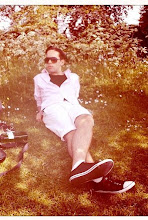First off, I want to make it clear that I wore a poppy yesterday, and will continue to do so for as many years as human beings are stupid enough to take up arms against each other. I would like to put in a plea, however, that the poppy/pin design is modified to better cope with today’s thickly-woven jackets, and tube-travelling lifestyles. By 11pm last night, mine was not up to a standard of neatness that I would usually strive for.
Each year that I’ve been old enough to choose to wear a poppy myself and not have it pinned on by my Grandmother, I’ve thought hard about why I wear it, and discussed my feelings towards it with friends. If any of us, as adults, decide to wear such a bold, culturally-laden symbol as a poppy, it is only sensible that we question why we do it, each time we do it. It’s very easy to drop 50p into the tin and pin one on because everyone else at the tube station is; even easier to change your Facebook profile picture to a poppy; add an avatar to your twitter. You’ll not be shocked to hear that I’m pleased by the debate around poppy-wearing this year – it’s healthy, it’s to be expected, and I feel much more comfortable living in a nation where we continually question and challenge our behaviour, rather than blindly follow path-dependent cultural norms.
Let me lay down my stall on poppy wearing: difficulty comes for me when attempts are made to load the poppy with multiple sentiments that do not necessarily sit comfortably next to one another. For many, the poppy is a largely pacifist symbol of remembrance: we remember our Grandfathers, and their Fathers, whom the state, on our behalf, conscripted, and dispatched across the world to fight fascism and tyranny. The ultimate loss of liberty in order to protect ours. We are free today because they, for those years of war, were not.
It’s an important point of contrast between the soldiers of today and the soldiers of the Worlds Wars that soldiers of today choose to join the Armed Forces, and are free to leave at any time. The relationship between those soldiers and us, through the mechanisms of the state, is different. As a friend of mine said yesterday, the thought of modern conflict – Iraq, Afghanistan, Libya – makes one angry, politicised, opinionated. The loss of life today is no less upsetting than the loss of life in 1916, but my reaction is too big, too complex, and too contrasting to my reaction to the Somme, that wearing a poppy alone cannot support that.
This year, the object of debate for me has been the British Legion poster with Dame Helen Mirren, showing her wearing a poppy with the quotation: “Our troops are the real stars.” The tag-line for the campaign this year has been ‘shoulder to shoulder with those who serve’, clearly marking a correlation between the wearing of the poppy and recognition of support for the UK armed forces. I don’t blame the British Legion for trying to keep the Poppy Appeal relevant. With fewer and fewer surviving veterans, they pointedly extend the remit of their appeal, beyond merely remembrance.
I’ve always felt uncomfortable with the celebration of ‘our troops’ above many other public servants. Social workers, nurses, teachers - they can be such remarkable people. And the context in which they operate doesn’t make me feel as uncomfortable as the hierarchical, tightly structured, wholly rigid, compliant, aggressive, homo-violent culture of the military. Let’s think about the word ‘stars’. ‘Stars’ emote glamour, excitement, glory. That’s not war, for Dame Helen’s sake.
So, how to conclude? First, people who wear a poppy should think hard about why they wear it, and resist blindly and easily following the crowd. Your poppy will hold much more weight if you can fully articulate what it means to you, what messages it carries. Similarly, people who choose not to wear a poppy shouldn’t be branded as ignorant. If the message of the British Legion marketing campaign is too much ideology for their poppy to support, then so be it. There’s no shame.
There also shouldn’t be an assumption that wearing a poppy means buying-in to military pomp or standing ‘shoulder to shoulder with those who serve’. There are people for whom watching a military parade is the emotional equivalent of a enjoying a really good bottle of red wine with a re-incarnated French poet from the 19th century. They wear a poppy, and so do I. Hey ho; never mind, eh?
During the two minutes silence yesterday, I was in the Terrace café in Parliament – moments from where votes were cast to send UK forces to Iraq in 2003, and a minute’s walk from the nation’s set-piece of collective mourning at the Cenotaph. At 11:02, the House of Lords display screen read ‘We Will Remember Them’, the boats on the Thames sounded their horns, and conversation re-started, with a collective intake of breath. I couldn’t, and wouldn’t, speculate what those 20 or 30 individuals then enjoying their coffees had thought during their two minutes. Anger fired by politics, pride from pomp, or remembrance. I simply hope it wasn’t blind, automatic, or thoughtless.
--
A small post-script. @DavidUnderdown9 has pointed out that conscription was only introduced in 1916 in the UK. A useful reminder, yet I would be very reluctant to make a strong comparison between the volunteer armies, the 'pals' battalions' of 1914 and 15 and the trained soldiers of 2011.
--
A small post-script. @DavidUnderdown9 has pointed out that conscription was only introduced in 1916 in the UK. A useful reminder, yet I would be very reluctant to make a strong comparison between the volunteer armies, the 'pals' battalions' of 1914 and 15 and the trained soldiers of 2011.

No comments:
Post a Comment